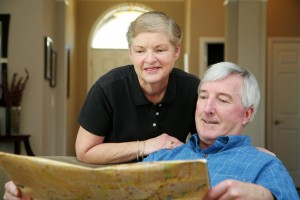Seniors face a crisis in transportation. Older individuals may have physical or mental impairments that make driving difficult, and public transportation may be unavailable or too difficult to navigate. Subsidized para-transit is available in many communities, but the process of scheduling a ride can be complicated. A lack of transportation can be a serious health hazard, as it can cause seniors to miss medical appointments and prevent them from engaging with a social support network, which helps maintain mental health.
 Today there are new transportation options such as the ride-hailing services Uber and Lyft, which can be faster and less expensive than taxis. These options have been embraced quickly by much of the population, but seniors may be less familiar with them. A smartphone is essential to using the new services, and older individuals may not have smartphones or may not be as comfortable using them. Among Americans over the age of 65, only 42 percent own a smartphone, while 77 percent of the general population owns one. In addition, someone with a physical disability may require a vehicle that can accommodate an assistive device such as a walker or wheelchair, and the new services may not be set up to handle such requests.
Today there are new transportation options such as the ride-hailing services Uber and Lyft, which can be faster and less expensive than taxis. These options have been embraced quickly by much of the population, but seniors may be less familiar with them. A smartphone is essential to using the new services, and older individuals may not have smartphones or may not be as comfortable using them. Among Americans over the age of 65, only 42 percent own a smartphone, while 77 percent of the general population owns one. In addition, someone with a physical disability may require a vehicle that can accommodate an assistive device such as a walker or wheelchair, and the new services may not be set up to handle such requests.
Companies and governments recognize that there is a gap in transportation services for seniors, and they are making improvements. Lyft built a new platform called Concierge that allows operators to request rides for others. On the Jitterbug phone marketed to older people, users can press zero to have an operator order a Lyft. A startup called GoGoGrandparent offers a hotline that seniors can call to hail a ride. Uber launched an UberAssist option for riders who need help getting in and out of vehicles. Washington, D.C. launched a service called Abilities-Ride, which subsidizes taxi rides for people with disabilities. The Massachusetts Bay Transportation Authority in Boston subsidizes Uber and Lyft rides for people who do not need the full services of para-transit. The AARP Foundation has begun a pilot program with Lyft and other partners to give free rides to people who may be in danger of missing medical appointments. With the rapid development of technology and the large market that seniors represent, transportation options are likely to expand.
Learn more about elder law, estate planning and special needs planning at littmankrooks.com, elderlawnewyork.com & specialneedsnewyork.com. Have questions about this article? Contact us.
Was this article of interest to you? If so, please LIKE our Facebook Page by clicking here.




 ke of their loved ones and themselves.
ke of their loved ones and themselves. As adults, we tend to take for granted an abundance of competency related normalcies that will one day begin to deteriorate, but there are many revelations that come with aging. One may wonder how our family members will find the proper person to take care of us when we are unable do so ourselves. How do our family members find the right person to take care of us when we are unable to do it for ourselves? The following is a list of considerations that need to be taken.
As adults, we tend to take for granted an abundance of competency related normalcies that will one day begin to deteriorate, but there are many revelations that come with aging. One may wonder how our family members will find the proper person to take care of us when we are unable do so ourselves. How do our family members find the right person to take care of us when we are unable to do it for ourselves? The following is a list of considerations that need to be taken.